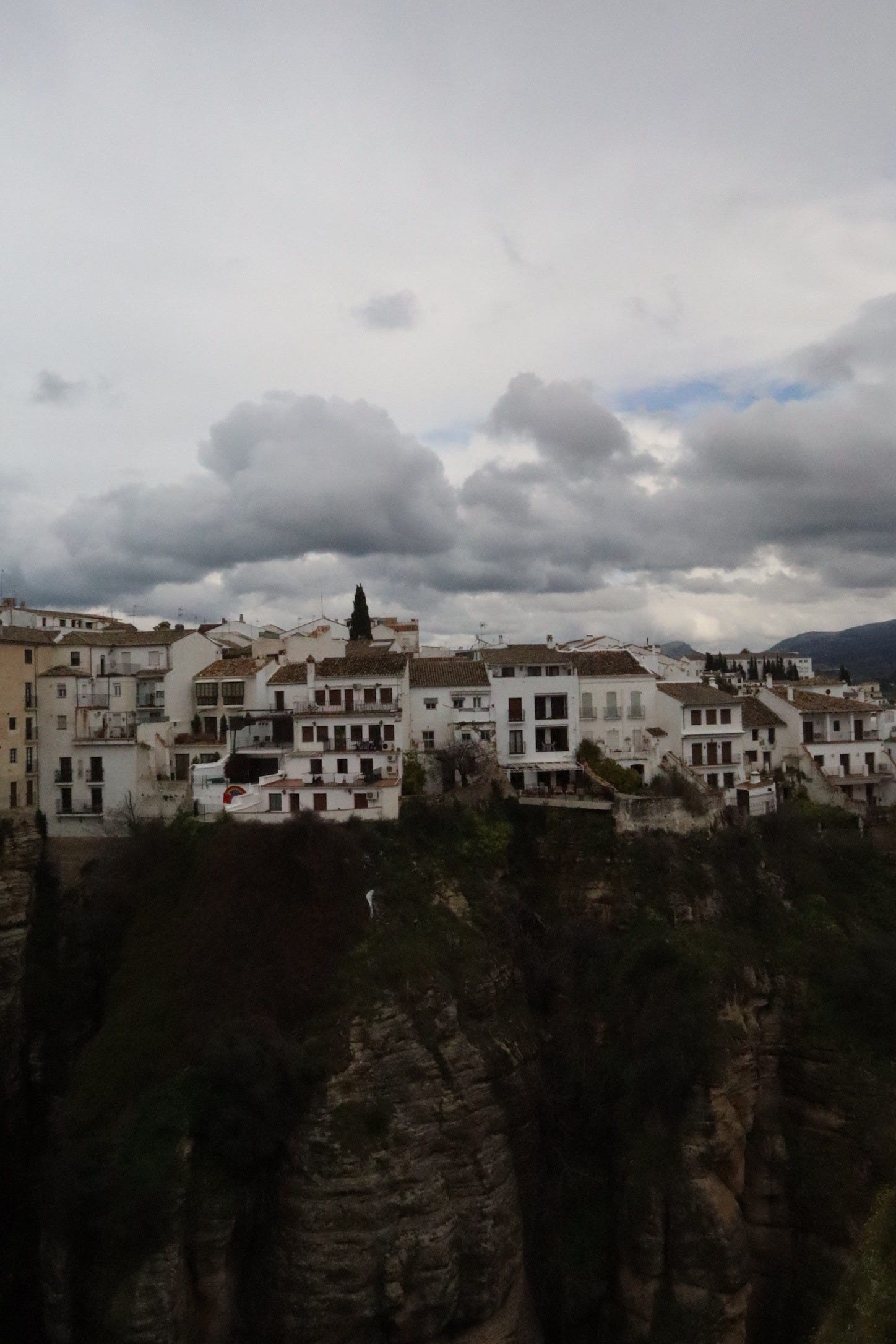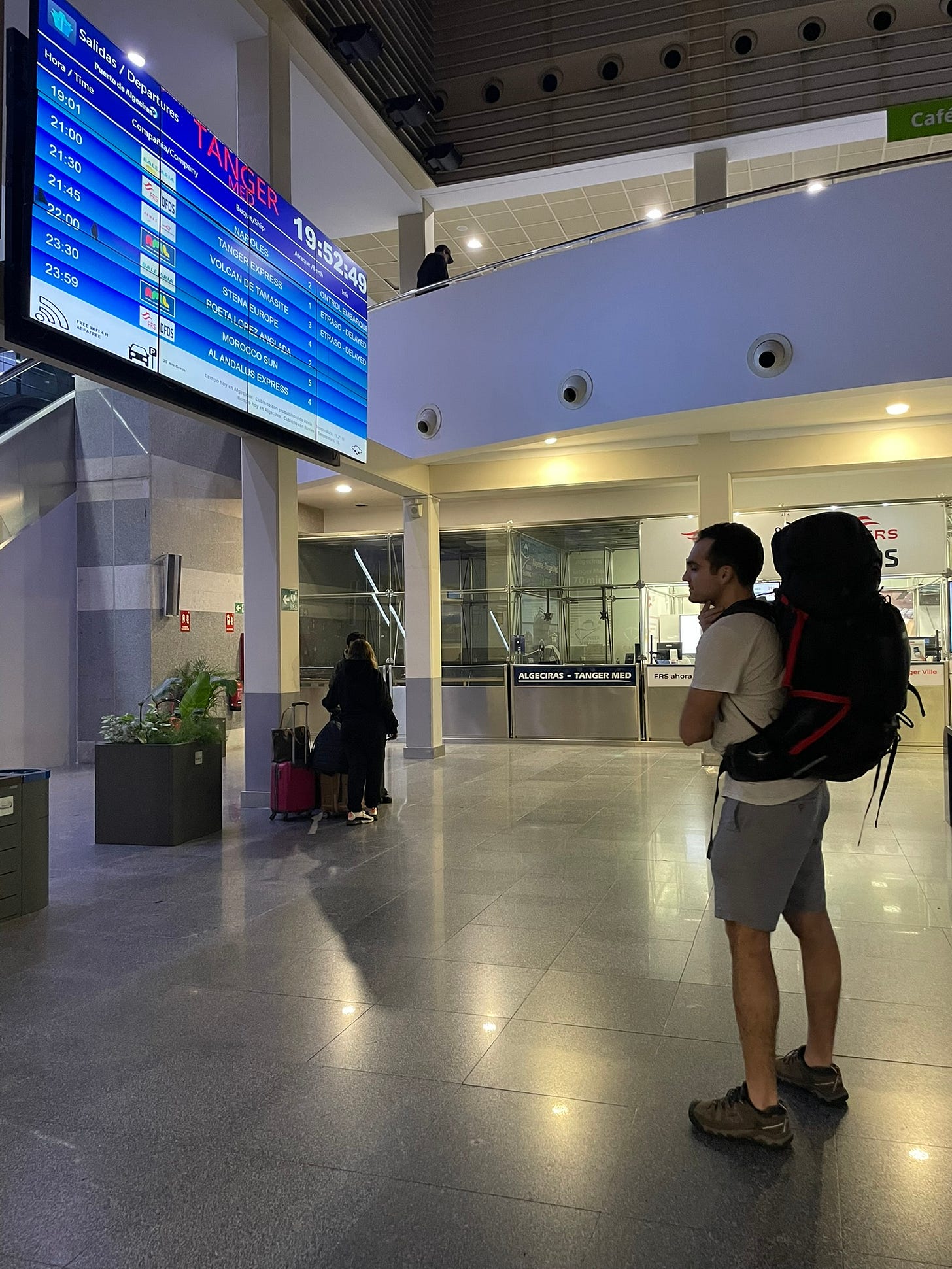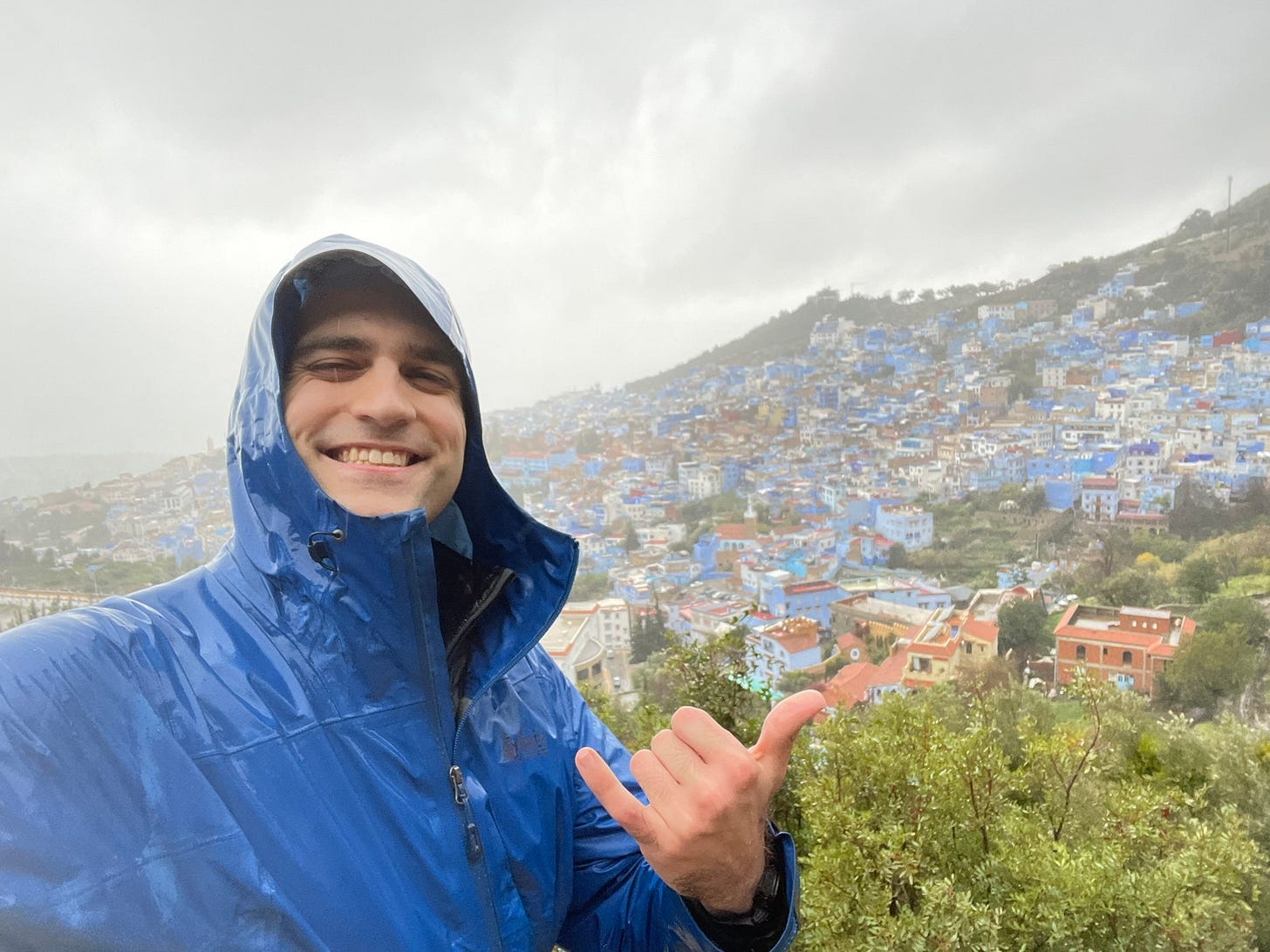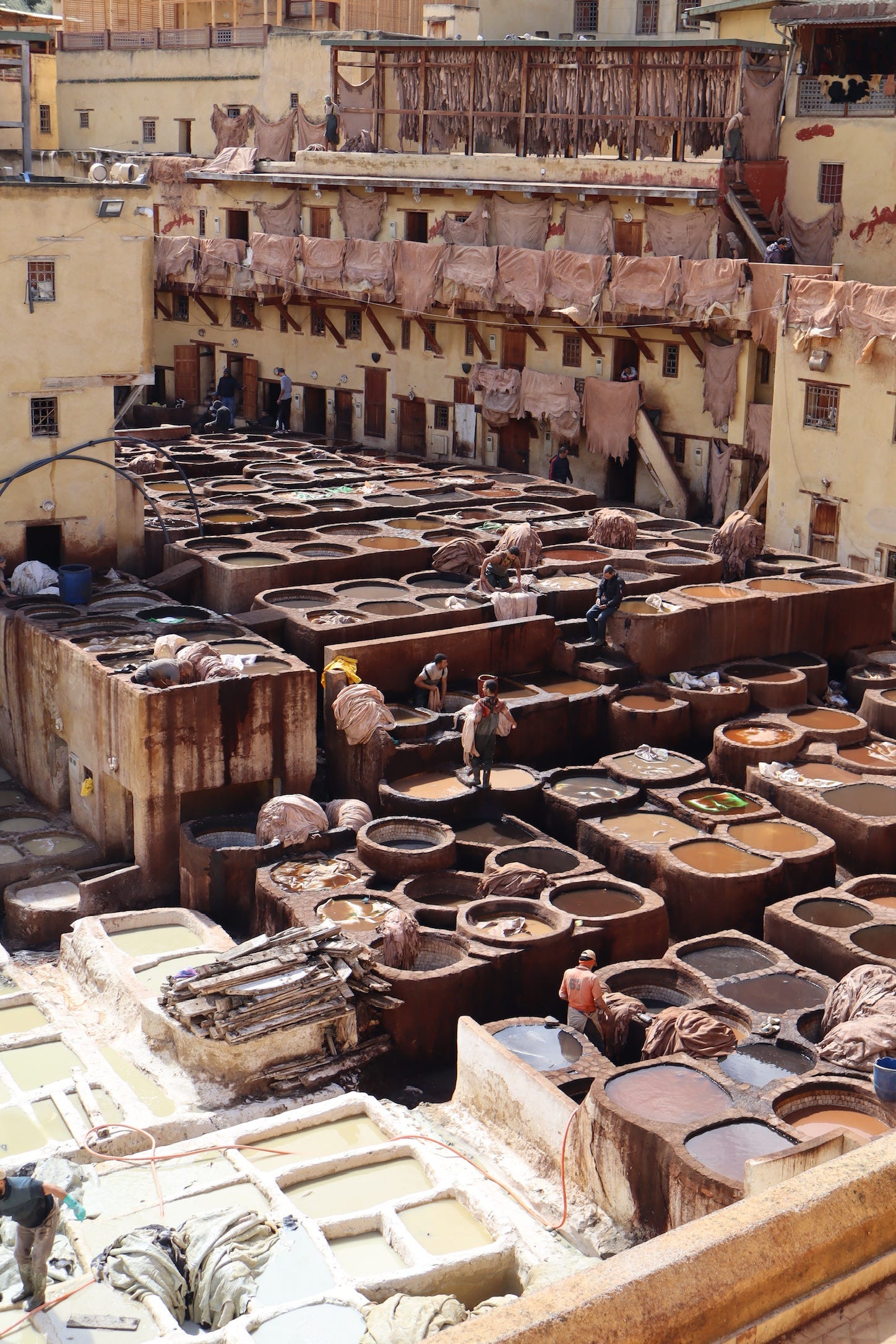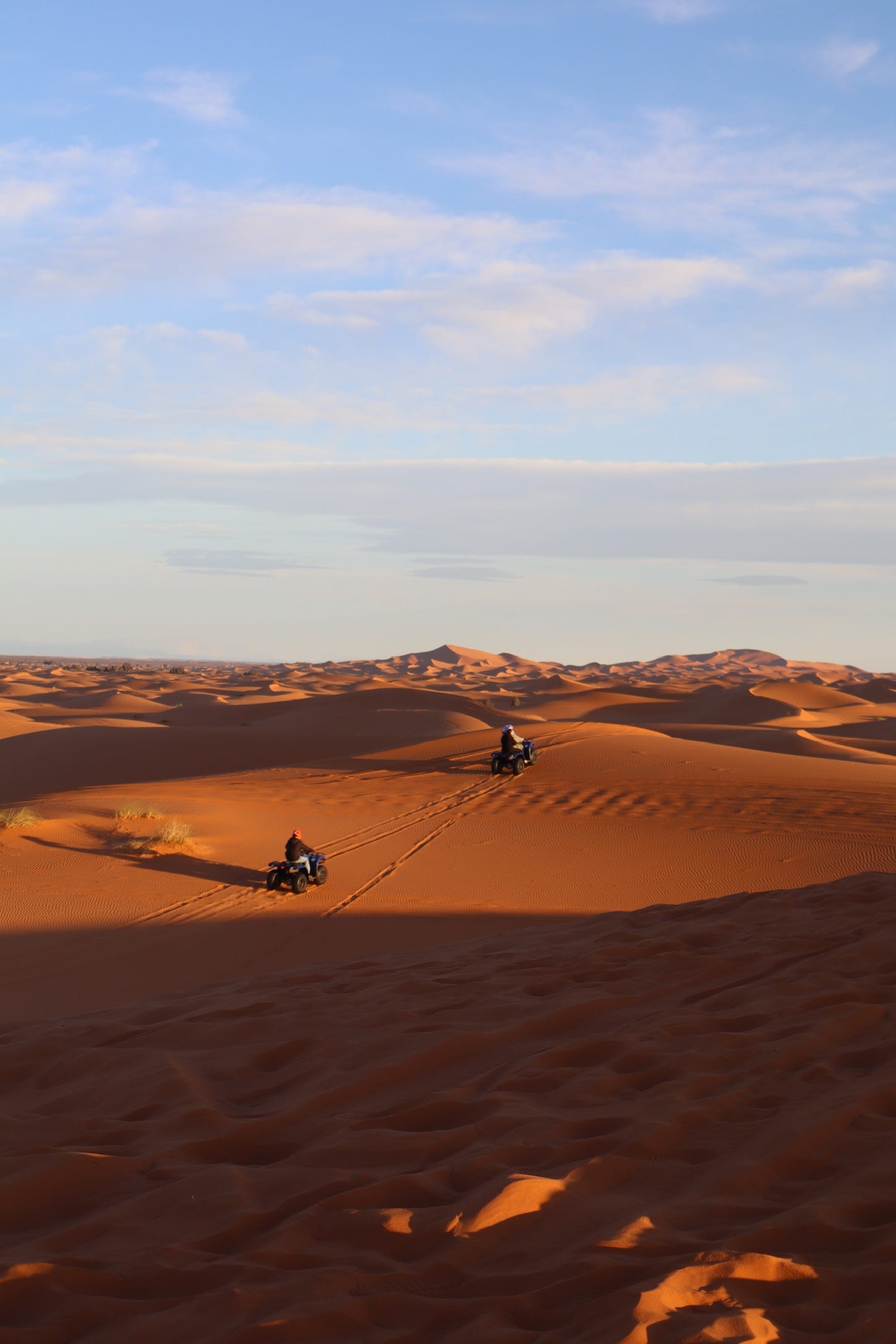I arrived in Seville hoping my travel troubles were behind me, especially after an unpleasant conversation with Mr. Orestes, a former Brazilian military officer. I wasn’t entirely wrong—Seville was incredible. My only regret? Not setting aside more time for this beautiful, history-rich city.
However, it would be a blatant lie to say that the Spain and Morocco trip was a hassle-free breeze.
Southern Spain and Honesty in Society
I rented a car—perhaps for the last time on this trip—and drove for a day in the south of Spain, on my way to Morocco.
After stops in Ronda (scenic) and Marbella (beachy and bougie), I arrived in Algeciras, the port town where I dropped off the car
.
The short road trip went fine. As I got close to Algeciras, I found it immensely odd when the gas station clerk told me to fill up the tank and then return to pay how much I owed. I still had about half a tank left, and since I hadn’t stopped before and didn’t know the tank size, I had no clue how much it would cost.
I left the gas station intrigued.
It raised a few questions: why was it immensely odd? Why did he trust me? Is this common in Spain?
I couldn’t imagine this happening in the US.
In case you’re not familiar with it, whenever you fill up at a gas station in the US, you either prepay a certain amount (paid too much? Your problem), or you use your credit card, but then the gas station holds (typically) $100 to make sure they get paid. A bit annoying.
A “pay later” scheme would never work in the US. Perhaps because gas costs may be one of the most psychologically painful. Or perhaps because of the high indebtedness rates in the US and a fear that people may avoid undesired costs as much as possible.
I suspect this trust exists because they likely record customers’ faces and will take legal action if someone drives off without paying.
In the US, it’s not uncommon for some cities, states, and private parties to not litigate if the amount of the theft is small, which though at an administrative level is economically sound, this habit creates a mindset of taking advantage where possible given the loopholes provided.
There are plenty of examples, but the ones that come to mind are shoplifting under $1,000, and fare evasion in the NYC subway.
Whatever the reason, we don’t see this level of trust between strangers in American society. Somewhere along the way, the social fabric has been torn, and many see each other as direct competition.
With these questions but no answers, I arrive in Algeciras to drop off the car. There’s no one at the drop-off area and I go to the agency’s office to return the key
The clerk told me that she couldn’t leave the office to inspect the car at that moment, but that I could trust her. The next day, a staff member would assess the car’s condition and reinstate my fuel deposit upon verifying the good state of the car.
Without further options, I agree, but feeling a bit uneasy.
Logistics Nightmares and the MI6 Agent
I then hop in a cab on my way to Tarifa. It was raining a bit, and I didn’t have time to waste. I was cutting close and wanted to hop on the short ferry to Tanger, MA, my next destination.
The Tarifa to Tanger route only takes about one hour, half of the Algeciras to Tanger-Med ferry. On top, it only takes 30 min from Algeciras to Tarifa, instead of the 45 min route from Tanger-Med to Tanger. It only seemed logical to go the shorter path.
It seemed.
Upon arriving at the port, which, aside from the staff, was empty, I was told that the sea conditions weren’t good, so they had to cancel all ferries that evening. The last one had left a few hours ago.
However, a friendly agent tells me, the Algeciras port was still open, and had ferries later on Tanger-Med bound.
“Algeciras!! I was just there…”
“Yes, the ferries on that route are bigger and they go through calmer waters”
Feeling a bit beat, I hop in another cab back to Algeciras.
One hour after leaving Algeciras, I’m back, and I learn the ferry was delayed, though it would still depart that evening.
The ferry was a bit of an experience in itself. Full of Moroccans and a handful of Westerners, mostly backpackers like me.
The ferry was comfortable, but not luxurious. As expected. They even had a cafeteria, which due to Ramadan, was fairly busy on a mostly empty ferry.
Despite the rain, the ride was smooth—after all, it was a large vessel. The Tanger-Med port is modern, with a very good infrastructure, and it doesn’t take long until I find the cab area.
As I was negotiating the taxi rate (there are no meters in Morocco), a fellow British passenger approached me and asked if I wanted to split the cab.
It was raining, I was still suspicious of the cab driver, as it was very hard to get to a reasonable price, and I did not have any dirham. All foreign exchange bureaus were closed since I arrived too late, and the dirham is a closed currency, meaning you can only buy and sell dirham within Morocco.
So, I give it a go. Sure, let’s split it.
My fellow passenger, Joshua, was an Englishman probably in his early 50s, with an elegant British accent. He dressed sharply, with a well-cut tweed jacket and a felt fedora. Very James Bond-esque, which fits the chaotic, yet fluid, scene.
He tells me he has been coming to Morocco for the past 10 years, and wanted a weekend escape from the bad weather in Europe, but he was so unlucky that it would be raining for the entirety of his stay.
Very nice backstory. Definitely in the MI6.
Jokes aside, I imagine sunny days and mild winter vibes in Morocco. Not 3 days of almost nonstop rain.
On Saturday, I explored Tanger, which was much more developed and clean than I expected. Then, I decided to take a bus in the afternoon to Chefchaouen, the Blue Pearl.
The Unique Journey to Chefchaouen
Chefchaouen is a small city in northern Morocco, with all buildings within the Medina (Moroccan old towns) painted blue. It’s small and beautiful.
I go to the bus station only to learn that, unlike what is announced on the website, there are no buses on Saturdays.
However, they tell me, I can take a shared cab to Chefchaouen, from across the street, or return the next day for an early bus.
I weigh my options, but my flight from Morocco to Portugal is in a week. I shouldn’t spend another day in Tanger.
Naturally, I decided to give this shared cab a shot.
I walk a few minutes to a rest stop where 30+ cabs are parked, drivers shouting city names, most unfamiliar to me.
I see a gentleman with a blue jacket with one or a few words in Arabic written in it, but below I see “organizateur”.
He puts me in a cab with a driver that spoke nothing but Arabic. The organizateur tells me to wait until others showed up. Once we had 5, he said, we would leave to Chefchaouen.
I sit in the back seat and wait. I have time, no rush.
It’s good to not be in a rush, for once.
“‘chaouen! ‘chaouen!”, the driver shouted.
After an hour, during which no one showed up, and it was pouring, he told me in a very broken French that I could either pay the full fare or take the bus the next day.
“I’m already here”, I think…
We then depart to Chefchaouen, a beautiful 2-hour journey. Through my phone, I ask the driver’s name and we chat a bit. I needed to build some rapport after negotiating the fare.
There are barely any cars on the road, but it takes an eternity. I really needed a bathroom break, but I was alone in the car. Moroccans are very friendly, but since I could barely communicate with the driver, the thought of leaving all my belongings in the car was beyond me. I thought of my college coach, who always told us “big boys can hold” when one of us asked for a quick break on our way to and from away games.
Though the driver seemed nice, I barely knew his name or how to find him if anything went wrong. I just couldn’t take the risk of being that tourist who loses everything to a random taxi driver.
I still had one hour to go, and during this time I may have heard a full playlist of Arabic prayer music. “Big boys can hold”, I kept repeating to myself.
I eventually get to Chefchaouen and, despite the rain the following day, it’s well worth it. It’s a beautiful little mountain town and I recommend the day trip if you’re ever in Morocco!
From Chefchaouen, I hop on a bus to Fès, the city with the biggest and oldest Medina in Morocco.
Fès and the Arabic Salespeople
After getting in a cab on my way to the hostel, I started noticing how Arabic people are very good at sales. Of course, I knew that going in, but seeing it for yourself was truly amazing.
Here are my days in Fès, told by sales lessons I picked up while there:
Anticipating demand and presenting the problem: any good salesperson knows that they need to provide a solution, and sometimes the customer doesn’t know he has an issue. My cab driver called an agent to offer a guided city tour. “You’ll get lost”, he told me. At first, I refused. After all, I had managed fine in Chefchaouen. But then, I nearly got lost on my five-minute walk to the hostel. The hostel staff tells me the same thing “you’ll need a guide here, brother”. I agree
Controlling the experience: the guided city tour is in essence a sales tour. They take you to all the main stops in the Medina, which range from the historical buildings to the most diverse shops. You never quite know how long you’ll be at each stop, and since the guide conveniently disappears once you’re inside a shop, such as the tannery I visited. You become more engaged—curious to learn about the products, even if you had no intention of buying
Product knowledge and passion: every single person I interacted with was extremely knowledgeable about what they were selling. The carpet salesman knew from the top of his mind the customs limits for each country. “Brazil? We can ship you up to 6 carpets. Australia? We can only ship you 1 carpet”, said the salesman, without hesitating. The saleswoman showing me cosmetic products was confident that the Moroccan products are the best on earth for your skin and hair. I believed her.
They make you feel welcome: from inviting you to the store and patiently answering your questions to respecting you when you say “no, thanks”, at no time I was pressured to buy anything. Even after the very fine mint tea they always offered! They are not pushy like used car salespeople trying to meet their quota at month-end
Selling with your ears: my guide showed me around the entire town with hopes I’d buy something, but at the same time he was asking me where I’m from, where I’m going, and how long my trip is. He promptly realizes that I will not buy anything, but he understands my time in Morocco is short, and that I had a flight in 3 days out of Marrakech. He made sure to include an additional stop on my tour at a Riad so that I could buy a desert tour, avoiding a long and tedious train ride through Morocco and improving my experience in the country. A lot of salespeople want to sell what they want to sell. The good one sells you what you want to buy
Presenting only three options: of course, I bought the desert tour. After an eight-hour journey to the Saara dunes, we are all tired but eager to hop on a camel on our way to the camp. It turns out, however, that camel riding makes for a good picture, but the 40-minute ride is a bit tedious, unlike the short 5-minute jeep ride to the place we hop on the camelback. Once we get to camp, we are told we have three options for sunrise, on this order:
Option 1: Jeep ride to Bedouin camp, plus sandboarding, plus optional 30-minute camelback ride (or more jeep)
Option 2: 90-minute camelback ride
Option 3: ATV ride (sounds sick!)
Anchoring: now, before telling you the prices, I’m already over my budget and painfully aware that I should slow down on spending. But then again—when will I be back in Morocco? Option 1, the Berbere guide tells us, €10 (hell no), option 2 is included (good), and option 3 is €50 (oh, option 1 doesn’t look that bad)
The entire time I knew I was being sold to, but at the same time it didn’t feel obnoxious, overly pushy, and intrusive. It even felt quite good, at times. Arabs are not good salespeople because of some magic gene. They are good because they apply time-tested techniques, with a smile on their faces, and a level of attention that makes everyone melt a tiny bit inside.
Had an amazing time in Morocco. Yalla, habibi!
Upcoming Itinerary
Here is my journey this week:
📍March 15-17: Porto, PT
📍March 18-19: Cascais, PT
📍March 20-24: Lisbon, PT
If you have any recommendations, please let me know!




